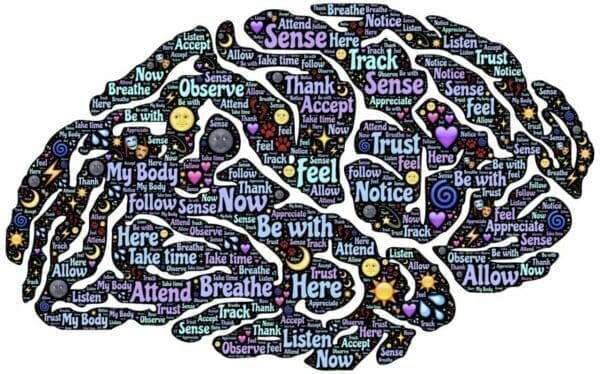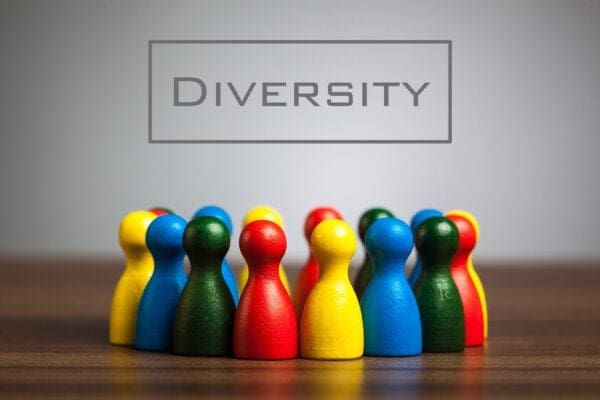Exploring What Mindfulness Can Bring To Marketing
Working in marketing can be stressful, even in normal times. But Covid-19 has made this last year traumatic. With mental health under pressure like never before, it’s time to take a new look at what mindfulness can bring to marketing.
Many people reading this will have been traumatised by events over the past year, but are holding down responsible jobs and cracking on despite feeling stressed and uncomfortable. Some are returning to the workplace after working from home or furlough and feel adrift. Others are starting new jobs and feeling insecure and anxious. Others are freelancing, living month to month and looking for opportunities.
What we all have in common is the haunting suspicion that no-one really cares, because staying strong in the lockdown has killed our empathy.
If you’ve had a hard time, your tolerance to stress may well be low. You can train yourself to manage your responses successfully and calm down. You can work on your self-awareness – practising mindfulness, recognising triggers as they come up and being grounded all help.
Happiness Is a Muscle
But you mustn’t let anyone tell you this is all tosh. Short daily mindfulness has a beneficial effect on your overall health. The neuroscience research shows it helps grow the grey matter in areas of the brain associated with self-awareness and compassion and shrink it in the parts linked with stress.
The part of your brain acting as the operating system will switch from the ‘lizard brain’ amygdala – the bit that generates the fight or flight response and makes us feel uncomfortable – to the default, task-based neural network we use to engage with the world normally.
The common assumption is that being happy is a state of mind depending on external factors. The experience of practising mindfulness suggests happiness is actually more of a skill, something we can train like a muscle. We can learn to control how we react to circumstances. If you’re tense, relax your shoulders and your face muscles. Smile. Breathe in. Don’t give up!

Crying Over Spilt Milk
A long time ago, I was a marketing trainee for a national grocery company. They have disappeared, though their bestselling tinned milk brand is still around. I was fresh out of college, with a shiny marketing qualification. The company took me on because I had done a final project about the marketing mix of one of their brands.
Back then I thought I was okay. Now, I realise my school days and family troubles had left me traumatised, with problems managing relationships because of stuff that came up. At a deep level, I was still trying to deal with past feelings. I was unable to be fully present and focus on here and now.
Being a marketing trainee was a big break, but with this other stuff in my head, I got anxious and distracted. I messed up big time. I wasn’t self-aware enough to work out how to engage with my colleagues in the marketing team and fix the situation. Perhaps they could have given me more to do or coached me.
But My Biggest Problem Was Me
It should have been a straightforward enough progression to assistant brand manager, and then who knows where, but I wasn’t grounded. I didn’t understand how to engage with the people I was working with.
After a disastrous time in head office, I went on the road as a Territory Manager. After some bruising encounters with our Regional Sales Manager and Field Sales Manager, I was knocked into shape. Finally, I was present, or as near as I was going to get at that time.
Fast-forward ten years. By now I was working in PR, still having run-ins with clients but less so. I ran into my old boss at a charity event for what later became GroceryAid. He observed, quite rightly, that in those earlier days I had a lot of growing up to do.
Nick (not his real name) was a natural athlete, into tennis and cricket. The Inner Game of Tennis was a personal development bestseller at the time. I play tennis terribly – being rubbish at sport is a long term source of humiliation and shame. Having gone to a sports-obsessed school, yes I ‘get’ sports as a metaphor for business performance. But Nick didn’t say much about how I could have used sports psychology to get in the zone at work
Sticky Learning ® is 7 times more effective than 1-day training courses. Plus, you will get a Chain of Evidence proving your Return on Investment. Discover soft skills training that changes behaviours long term.

Mindfulness and My Recovery
The years went by. I got over my early disappointment in marketing and worked for a long time in PR and trade publishing. There were stresses, but I took them on the chin. I was still rubbish at sport: if we went ten pin bowling at work, I was embarrassed, but it wasn’t crippling.
By now the term mindfulness was in everyday currency. But I didn’t feel the need to learn about it until last year, 2020, when I was recovering from a mental breakdown caused by sepsis, which I had contracted after surgery for a broken leg and smashed hip. It was a stressful time.

I came out of the hospital a few weeks before the first lockdown and I was struggling. I was on crutches and taking antipsychotic drugs, which were knocking me out. Thankfully, I was well enough to reach out for help. Because of my grocery background, I secured counselling with Grocery Aid’s wonderful Helpline.
This Flagged up Wider Issues
I decided to have more therapy with the local wellbeing service. The therapists concluded I’d been able to live successfully with the trauma from my earlier life, but the hospital had brought it back to the surface.
Having been unable to do my job through illness, I was working from home along with everyone else, freelancing in trade PR and journalism. By now, the pandemic was impacting the grocery world. Trade comms was changing too. I wrote a piece on effective trade communications in the new normal for Darren A. Smith, which he posted on the MBM website.
Among other things, my article flagged that the print side of the trade media, I had spent nearly two decades in had lost its precedence in a shift to digital. This shift was very clear as I looked for work. With advertisers pulling campaigns all over the place, the mags were coming out with thin issues, cutting publication frequency and, in some cases, moving to digital-only. The bottom line was less call for the long-form feature writing and interviews I had been doing, and less work for me to do.
Work Is, of Course, a Classic Way To Avoid Dealing With Troubling Feelings
With time on your hands, it’s harder to escape from yourself. But in my case having this free time meant I could have therapy, on Zoom, leading me to learn more about grounding techniques and the neuroscience behind mindfulness and the various coping strategies.
In trauma recovery, they talk of survivors being expert at keeping their bodies in the present while their thoughts and emotions are elsewhere. For people having difficulties returning to work, it doesn’t have to be like that. You can do exercises that foster the development of self-awareness and processing trauma on a ‘feeling’ level, so you cope with those emotions and regulate them. These exercises are basically applying mindfulness and being grounded.
Mindfulness in Business: Person To Person Marketing
Now let’s look at how you bring mindfulness to bear in one to one meetings or group work and person to person marketing.
A measure of stress is perfectly healthy in day to day working life, operating either remotely or face to face, talking to colleagues and customers or in job interviews. We normalise and recognise the reactions anyone would have at these times. Controlled and managed, the adrenalin released in these transactions is positively beneficial, making us more alert so we perform better.
Feeling stress at work is ultimately part of having a healthy range of emotions. But mindfulness can help make it more comfortable. Plan your conversation, but in the moment, be sure to engage the others as people. When you arrive in the meeting, be grounded. Empathise with them like you would with a distressed friend.
If you’re taking notes of the conversation, don’t paraphrase what the other person says, you’ll miss what they’re saying. Write down their exact words. Hang on to their every word and respond to it.
Be Present, Focused on the Customer, Validating Them
You wouldn’t multi-task while talking to your partner or your child, they wouldn’t like it. So don’t multitask with the customer, especially on a Zoom call.
When the stress rises to uncomfortable levels, or we react badly because we’re triggered, mindfulness can transform the situation. The key is to be grounded and get back to being present as soon as possible.
When you get tense, work out where in your body you feel it. Relax your shoulders. Sure, the customer is right. But you don’t have to be a people pleaser or fawn to them and deny yourself. Respect them but be authentic. They’ll respect you more if you stay authentic under pressure. Give yourself time to respond. Resist the fight or flight reaction telling you to do or say the first thing that comes into your head. Recognise it, stare it down. Stay ‘in the room.’
Mass Marketing in the Moment
The other aspect of marketing is mass marketing As the lockdown gives way to the new normal, a changed Britain is emerging, even for people who’ve had an easy time. The big change in the lockdown is social media. We don’t talk to people face-to-face, we’re constantly on our phones.
After I came out of the hospital, like everyone else I relied heavily on social media for information and as a connection with the world. As I spent more time on social, particularly LinkedIn, it became evident I was surrounded by people in varying states of anxiety. They were all frantically empathising or reacting against posts in order to be ‘liked’. It seemed everyone had been traumatised by the lockdown and needed special treatment.

That might sound over the top, but ‘social’ does have a profound effect on our emotions. A study by the University of Southern California in 2011 – a few years after Facebook launched – showed three out of four college students were 50% less empathetic than their equivalents thirty years before. Digital information overload numbs us, overwhelming our emotions, pulling in.
Unstable (?) Consumers
Thanks to our isolation, consumers, even here in the UK, are unstable, self-obsessed and vulnerable in terms of how we react to marketing. And it’s getting worse as we spend more and more time on our devices, up to six hours a day in 2020 from five the year before.
Like those students in Southern California, we’re distracted, our attention’s short. We respond to social media with hypersensitivity, if something triggers us, but at the same time, our boundaries are raised because we’ve been clumsily sold to and pitched to over the years.
As consumers we want marketers to make us feel validated, that they appreciate us. Businesses who get this right make us feel wanted and valued, especially in our anxious and insecure state after all these lockdowns.
Attention Is Tension
There’s so much availability in social, always something else coming up. What’s in short supply is attention. You want your activity to stop people and make them respond. Before they have a moment of self-awareness and decide to do something more worthwhile besides look at their phone or tablet!
Mindfulness for marketers in social media means putting ourselves in the shoes of the person reading our content. It involves monitoring what your audience is talking about and building an authentic emotional relationship, which will underpin engagement.
Consumers Are Harder To Pin Down
In our mad era, the audience is splintering from mass markets to groups and communities which match their interests. In these communities, they’re even more likely to respond differently. It all adds to social not being a stable state but constantly changing. If your business depends on knowing your customer, this fluidity could get stressful! Get back to the mindfulness practice!

Social for marketers is about getting the consumer’s attention and taking them on the journey from emotional empathy – our instinctive, animal response – to cognitive empathy, where they buy into the fact you’re offering them something to benefit them. The image stops you first, then the headline. You have seconds to stop them scrolling. If the picture or the headline disappoints them, they may never trust you again.
A sobering 43% of consumers are spending more time on social since the pandemic started. But if you’re pondering the effect that extra time online is having on our receptiveness, think back to the falling empathy of those students at the University of Southern California…
We’ve Been Deprived of Human Contact
Staying with mindfulness, in the past year people have been deprived of human contact. They want more of the human touch in social media. In the past, they may have resisted advertising and been blasé about it, but now they want to be engaged with brands. This was one reason why the recent Weetabix Breakfast activity with Heinz Baked Beans was so well received. Brands can be timely, witty and unexpected, including joining in with other brands, as happened in this instance.
Another phenomenon of Covid is that businesses increasingly want to stand for something in these troubled times and participate in conversations about wider issues than their product propositions. But without authenticity and substance, it’s meaningless virtue signalling.
Be Mindful of Your Audience
Different people have different reasons for buying. Who are they, what makes them tick, what triggers them? What makes them sceptical? Which platforms do they like? If you can’t use all the platforms that are trending, use platforms that are right for you to help you develop the relationships you want with your different audiences.
Empathise with your audience to the nth degree. Be prepared to listen and say, ‘Yes, I understand your point of view,’ just as if they were in the room, like the other people in your person to person marketing. And with so many ways for people and businesses to be ‘virtuous’, from diversity to veganism to sustainability, make sure you’re comfortable with what you’re putting out, that you are sure of your values and can articulate them.
Ultimately, it comes back to Jeff Bezos’s quote:
‘Internet shminternet, the most important person is the customer.’
You’re engaging with living human beings, even in cyberspace. Like a real conversation, work out what you want to say and try to predict how they will react? Think about the relationships you want to build and the learnings you want them to take away. Test and learn. Try things out. Be prepared to be nimble and pivot, just like in real life. Like in real life you can’t be perfect, but you can be authentic.
You’ve Got To Start Somewhere. So Start.
And don’t fear the worst, or tell yourself you don’t know what you’re doing. No-one really knows what’s going to happen. Instead, try and imagine the best outcome. Mindfulness is all about being positive and turning situations around by opening yourself up to what’s actually happening. Now take a deep breath and get out there!




